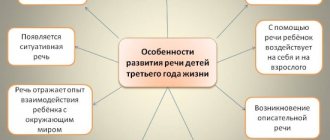Timely development of speech is an important part of the development of the personality as a whole.
It is by communicating with others that the child develops intellectually and mentally. Lagging behind peers can lead to not the best results. Cute babbling and mangling of words at a year and a half turns into a big problem at an older age. By the age of 4-5, a child should be able to speak his native language correctly - When should a child start speaking? Norms in speech development. Uninformed parents may rely on the widespread belief that before the age of 5 it is too early to contact a speech pathologist. Like, each child develops individually, and yours is about to speak in detailed sentences.
My child does not speak, is silent, speaks little, speaks poorly!
At a Sarclinic consultation, parents ask: “ Why doesn’t a 3-year-old child speak, doesn’t speak , what should I do?” “ A 4-year-old child speaks poorly and is silent !” “Why doesn’t a boy speak for 5 years, where should I go?” “A 6-year-old girl does not speak, speaks poorly, how to treat?” “ Why does a child speak poorly or say few words? “ How to teach a child to speak and talk?” “What to do if a preschooler, schoolchild, boy, girl does not speak in sentences, as if he has porridge in his mouth?” “How to help a child if speech development suffers, there is no active speech, speech centers suffer, and there is no vocabulary?” “Children younger than us form sentences, and we moo, where should we turn if just mooing is all?” “When will the baby start talking?” Let's look at the main reasons why babies don't speak.
Prevention measures
Special prevention is simple:
- You need to talk to your child more. This will help develop perception skills. Then, it is through auditory experience that a person comprehends the subtleties of his own verbal speech and communication.
- You can't distort words. You should communicate in normal, literate language.
- It is worth buying educational toys, be it construction sets, pyramids, logic toys and others.
- It is necessary to promptly treat possible ENT and neurological pathologies.
Read about other speech therapy defects in our articles:
- Dislalia
- Dyslexia
Reasons why a child does not speak
The main reason why a boy or girl, son or daughter, son or daughter, son or daughter (daughter), a child does not speak is intrauterine hypoxia, or lack of oxygen. Lack of fetal oxygen can occur during pregnancy, during childbirth, and during caesarean section. In this case, an experienced microneurologist , pediatric neurologist , pediatric neurologist makes a diagnosis of “perinatal encephalopathy of post-hypoxic-ischemic origin” or “perinatal encephalopathy of mixed origin” (perinatal damage to the central nervous system). Perinatal encephalopathy can be grade 1, 2, 3.
Stage 1 perinatal encephalopathy with timely and comprehensive treatment at Sarklinik is completely cured in a fairly short time. Stage 2 perinatal encephalopathy is a serious disease that requires long-term serious treatment. Stage 3 perinatal encephalopathy usually has serious consequences, including the development of pathology such as cerebral palsy. Frequent causes of delayed speech development in children are pathology of the mother during pregnancy, birth trauma of the child, difficult childbirth, poor results of neurosonography, entanglement of the umbilical cord, breech presentation of the fetus, weakness of labor, anatomically or clinically narrow pelvis, somatic diseases of the mother before and during pregnancy, maternal infections, fetal infections, toxic effects on the child's brain of bilirubin in hemolytic jaundice of the newborn (HDN), intoxication with anesthesia during cesarean section, intoxication with drugs (drugs) in the perinatal period. Any somatic pathology, ARVI, bronchitis, tracheobronchitis, infections, rickets, metabolic disorders lead to the fact that at a later age the child does not speak , the child speaks poorly , the child speaks little , the child is silent , begins to speak late, speaks little, is not clear , incomprehensible, retarded in development, retarded in speech, mental, psychomotor, psycho-speech development, mental development.
There is RRD (retardation, delayed speech development, including severe delay in speech development), ZPR (lag, delayed mental development), ZPRR (delayed psycho-speech development in children), PMR (delayed psychomotor development in a child), ZUR (mental retardation). development in children). Rarely, a child is influenced by hereditary factors in which developmental delay was observed in the mother or father, or in both. Any weakening of the child’s body, decreased immunity, side effects of vaccinations (vaccines) can lead to the fact that “ the child does not speak .” Also, a child’s speech development is negatively affected by an unfavorable environmental situation in the area where the mother and child live, an unfavorable climate in the family (conflicts between parents), defective, unclear speech in a contact environment (speech problems among relatives or parents), the birth of a second child in the family, the presence of severe severe neurological diseases (for example, cerebral palsy). With delayed motor development, there is often a delay in speech development, and later a delay in mental development. With any damage to the organ of hearing, a condition in which “ the child does not speak ” is also noted. In this case, you need to consult an otolaryngologist (ear-nose-throat-doctor).
What to do if the child does not speak?
Many parents turn to a speech therapist with this question. But a speech therapist can make sounds, the letters “r”, “l”, “sh”, “shch”, hissing, if the child can respond to classes. A speech therapist is a teacher, not a doctor. With hypoxic lesions of the brain and central nervous system, the speech therapist is powerless. In these cases, complete comprehensive speech rehabilitation of the child is needed. Unfortunately, some careless parents, mothers and fathers wait for the child to speak on his own and naively think that he is being lazy. But we must not forget about the norms of speech development. At 1 year old, a child should speak 10 words, at 2 years old – 50 words, build phrases and sentences from 3 – 4 words. By the age of 2.5 years, a child normally speaks from 100 to 200 words and constructs sentences of 5 to 7 words. At 3 years old, a child absorbs the words of adults like a sponge, should already speak in complex sentences of 6-8 words, and at 4 years old, the vocabulary should already be about 2000 words.
Diagnosis or how to identify the disorder
Diagnosing patients is a rather difficult task. Survey methods include the following:
Questioning a child. If he doesn't speak well, he needs help from a group of doctors. The first task is to exclude organic pathologies. To do this, you need to consult an otolaryngologist. An ENT doctor identifies pathologies of the ears (otitis), nasopharynx and oropharynx (adenoids, tonsillitis). Eliminates hearing loss. If it is impossible to determine the intensity of hearing on site, the child is referred to an audiologist.
The audiologist checks the patency of the auditory tract, uses a special apparatus, and draws a chart. It is easier to work with this data.
The child is then examined by a neurologist. Conducts basic examination, checks reflexes. Prescribes instrumental diagnostic methods. For example:
- duplex scanning of cerebral vessels to assess the intensity of blood flow in cerebral structures;
- if necessary, prescribes ECHO KG, ECG, and also electroencephalography to monitor the work of the heart (it is responsible for feeding the brain), brain activity.
If no organic pathologies are found, they look for mental disorders and problems. Clinical psychologists come into play. A series of tests are carried out, adapted to the child’s age. For perception, representation, speech. Everything that is involved in the speaking process and can be disrupted. In addition to the tests, the specialist talks with the child, finds out how poorly he speaks and what is the reason, and makes recommendations.
As a rule, in the matter of diagnosis one cannot do without a speech therapist-defectologist. His task is to study the speech apparatus. And then correct the violations and teach the patient to speak correctly.
The help of a psychiatrist is also necessary. Its task is to identify possible disorders of higher nervous activity: autism, mental retardation, and other types of dementia. All this is part of the psychiatrist.
If a child speaks poorly at the age of 5, consultation with all specialists will be required. Because complex violations are possible. In system.
Which doctor should I see next? Speech and intellectual impairments occur with endocrine disorders. Therefore, it would not be amiss to consult with an endocrinologist.
The earlier treatment for speech disorders is started, the higher its effectiveness.
When speech development is delayed, an important point is the time of initiation of treatment. If a child does not speak 10 words per year, then there is no need to wait until he is 7 years old when he “starts speaking on his own.” After all, precious time is wasted. The later treatment is started, the more difficult it will be to catch up with healthy children of the same age, since with increasing age the lag will become noticeably larger and larger. Some children, when their parents address them, understand the speech addressed to them, but do not respond, there are only gestures. Some children do not understand the spoken language and do not speak. Which is very bad. And if children speak little, indistinctly, then speech correction is needed.
Recommendations from speech therapists
In order for the speech of a five-year-old to develop and improve, and to eliminate speech defects, speech therapists recommend:
- Find out at what age older family members began to speak. Delayed speech may be hereditary.
- Remember whether prematurity or infectious diseases occurred in infancy - these are factors for delayed speech development.
- To understand whether it is possible to transfer to a speech therapy group if you have speech disorders.
- Undergo a mandatory scheduled examination by a speech therapist every year starting from 2-3 years of age.
- Check for hearing loss.
- Family troubles have a negative impact on a child’s pronunciation; you need to create a calm atmosphere.
- You need to talk a lot with your baby - pay special attention to this moment.
- Practice logarithmics with your beloved child and learn poems with motor exercises - such a pastime contributes to the development of speech and mutual understanding with children.
- Do exercises and games with him to develop fine motor skills of his fingers.
If necessary, drug treatment, physiotherapy, massage and special therapeutic exercises are prescribed. Only the hard work of parents with the help of specialists will help form correct and beautiful speech in a child in this case.
Treatment of children with delayed speech development, how to treat children with speech disorders
Fortunately, Sarklinik has treated hundreds of children with delays in speech, psycho-speech, mental, motor, and psychomotor development. Treatment of alalia, treatment of dyslalia, treatment of general speech underdevelopment, treatment of dysgraphia, treatment of acalculia, treatment of encopresis, treatment of perinatal encephalopathy, treatment of tone disorders, treatment of akataphasia, treatment of akatagraphy, treatment of intracranial hypertension syndrome, treatment of dyslexia, treatment of autism, treatment of cerebral palsy, treatment are provided. enuresis, treatment of minimal cerebral dysfunction in Russia, in the Saratov region, in Saratov. Sarklinik knows how to teach a child to speak, how to treat and cure a child, how to treat delayed speech development in a child , how to treat delayed psycho-speech development in children, how to cure delayed neuropsychological development, how to give impetus to speech development, how to replenish vocabulary, how improve speech. Treatment methods have proven themselves over the years. Severe, moderate, and mild delays in psycho-speech development, and mental retardation are treated. Sarclinic works with serious diagnoses, when parents have less and less hope for recovery. Unfortunately, in such cases, as a rule, multiple courses of complex treatment are required, as a result of which memory, thinking, speech, mental development, motor sphere, and motor activity are improved. There is extensive experience in treating children with pediatric pathologies aged from 3 months to 17 years. There are plans to publish a video course “ How to teach a child to speak ?” On the medical website sarclinic.ru you can ask a doctor a question online for free and read patient reviews. Help your child right now!
There are contraindications.
Specialist consultation is required. Sign up for a consultation .
Text: ® SARCLINIC | Sarclinic.com \ Sarlinic.ru Photo: (©) Hyrman | Dreamstime.com \ Dreamstock.ru The child depicted in the photo is a model, does not suffer from the diseases described and/or all similarities are excluded.
Related posts:
Speech areas of the cerebral cortex: motor, sensory, Wernicke's center, Broca's center, treatment
Enuresis in girls, treatment of enuresis in girls, nocturnal, daytime enuresis
If a patient with Tourette syndrome does not want to be treated, what to do?
Birth trauma, how to avoid birth trauma?
Children's rehabilitation in Saratov
Comments ()
Are there additional speech correction methods?
Yes, additional practices exist. This is dolphin and hippotherapy.
Communication with horses and dolphins brings a lot of pleasure and has proven itself in the treatment of children with delayed mental and speech development.
This is also art therapy. Therapeutic effects through the means of fine art, the perception of music, the creation of theatrical images, gaming techniques, and the use of puppet characters mobilize the child’s creative potential, activate the internal mechanisms of self-regulation and healing.
Osteopathy gives good results for mental and speech retardation. Manual influence on certain areas allows you to balance the activity of the nervous system and improve the baby’s mental state.









